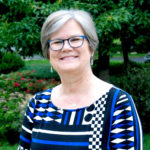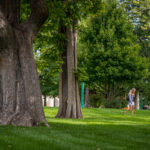A longtime advocate of creating opportunities for faculty members to enhance their educational and leadership skills, former Baker University School of Nursing Dean Kathleen L. Harr has established an endowed fund for SON faculty development.
Harr, the school’s nursing dean from 1997 until her retirement in 2015, contributed $13,000 for the fund that will provide resources that ensure faculty members continue to grow in academic nursing.
“I am extremely grateful to Kathleen Harr for this opportunity to build faculty development at the national level and create lifelong learning within the School of Nursing. Baker University faculty members can have a voice and a significant role to play in the profession of nursing and academic scholarship of today. This would not be possible without the funding.”
said Mary Hobus, the Baker nursing dean since 2020
Founded in 1991 in Topeka, Kansas, Baker’s School of Nursing has 21 full-time faculty members serving 166 students pursuing either a Bachelor of Science in Nursing degree on the campus of Stormont Vail Health or studying online in the Master of Science in Nursing program. The school will soon begin an online Associate Degree in Nursing to Master of Science in Nursing program.
“During my conversations with Mary, I was delighted to learn that she shared my passion for faculty development. The better prepared the teachers are, the more effective they are in guiding students to be the best nurses possible. We always felt that Baker pride that we prepared our students well, and I always said it was my joy to see them graduate and become successful in their chosen area of practice.”
Kathleen Harr
Developments in the profession require nursing administrators and faculty to reevaluate the curriculum in graduate and undergraduate programs. The American Association of Colleges of Nursing recently updated the curriculum guide that identifies the “Essentials for Baccalaureate Nursing Practice.”
“When that document is updated, it then becomes necessary for the faculty to immerse themselves in curriculum review and revision,” Harr said. “The conferences held by the AACN help to educate faculty on the changes and expectation with that process.”
In addition to the endowed fund, Dean Hobus will have a restricted fund for the coming academic year.
The AACN is the national voice for academic nursing and works toward developing standards for nursing education and practice; improving health care; and promoting nursing through education, research, and practice.
With the endowed funds, Hobus plans to send faculty members to the AACN conferences yearly. Full-time faculty members will have the opportunity to attend conferences that focus on innovation and excellence in academic nursing; advancing improvements in health, health care, and higher education; understanding the importance of diversity and inclusion; and increasing the depth of knowledge on advancing academic nursing issues and trends. Additionally, faculty members will have the opportunity to participate in health care policy.
“After attending the conferences, faculty will have an opportunity to share this knowledge with other faculty members on the team and with their students in the classroom or during clinical experiences. Thus creating an environment of excitement and lifelong learning.”
Harr said.








